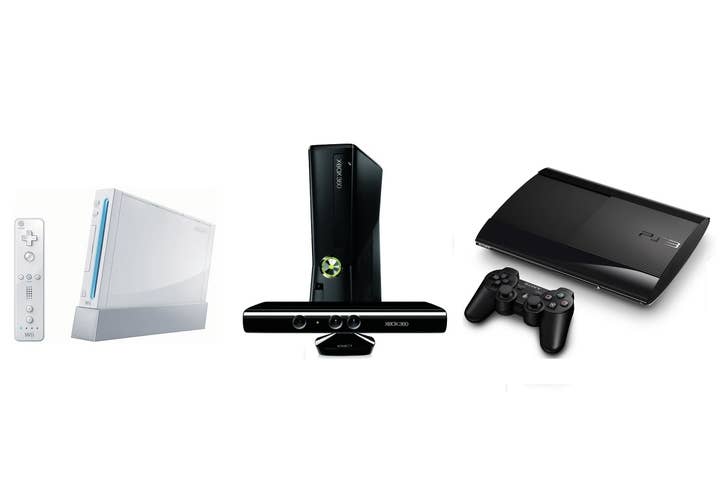The Greatest Generation
GamesIndustry International looks back on the past eight years as a golden age of gaming
The current generation of consoles started in the holiday season of 2005, with the launch of the Xbox 360. With apologies to the Wii U, the next generation will begin this holiday season when the Xbox One and PlayStation 4 arrive. The intervening years have been some of the most eventful in gaming history, changing and challenging our definitions as to what games are, who plays them, who makes them, and how. Whether or not these developments actually happened within the console space (and many of them did not), their impact has not been limited to one platform, or any corner of the industry specifically.
We may disagree about what we want out of games, what games should be, and what trends may be good or bad. Regardless of what our positions are on those subjects, we should be able to look back on this generation as a golden age of gaming. For posterity and perspective, here's an incomplete chronicle of events of monumental significance from the past eight years, each prefaced by some brief thoughts from industry voices with first-hand knowledge of the situation.
Steam Redefines Digital Distribution (Ongoing)
"No company is perfect, but Steam is by far the gold standard in digital distribution. Everything they do from developer support to storefront curation and planning is top notch. A game can be released on Steam and potentially make millions of dollars all without the need for a publisher and every other expensive and sometimes unnecessary obstacle developers have to overcome for other distributors."--Tommy Refenes, Team Meat
Yes, Steam was first announced in 2002, but it wasn't until 2006 when Valve really opened up the catalog to games from third-party developers and publishers. And that's when it really started to resemble the service we know today. Since then, people have essentially stopped predicting the death of PC games. And it's not because the shelves at GameStop are suddenly cluttered with copies of Surgeon Simulator 2013.
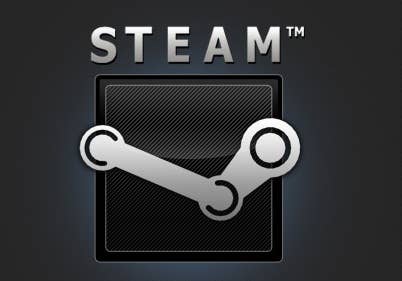
Steam has become a one-stop shop for games, whether it's the latest AAA release from a major publisher or a one-man indie studio with an interesting idea. Steam has become the Amazon.com of PC digital distribution (all the more impressive considering Amazon sells downloadable games itself). But there's one trait Steam shares with a brick-and-mortar titan like Walmart, and that's the demand for shelf space. So many people want their games on Steam that Valve has largely outsourced those decisions to its customers.
But Steam has meant so much more to PC gaming than just being another place to spend money. It addressed piracy. It addressed problems with patching. Like Xbox Live, it brought the social sphere into the same place as the storefront and the games themselves. And it has done all of this while maintaining a reasonably pro-consumer approach to its business (as regular customers during Steam's seasonal sales will tell you).
Guitar Hero: Birth of a Rock Star (November 2005)
"Before Guitar Hero, music/rhythm video games were not in the top 10 genres of games sold in the US. Americans didn't buy music games. By Guitar Hero 3, we sold $1 billion (with a B!) worth of Guitar Hero product. Guitar Hero became the second game to crack $1 billion sales in a single year. We heard similar stories of Guitar Hero's impact on music sales too. Guitar Hero not only changed the video game world, it shook up the music world as well."--Charles Huang, co-founder of original Guitar Hero publisher RedOctane, CEO and co-founder of Green Throttle Games
These days, the Guitar Hero name conjures up memories of closets jammed full of plastic instruments and a relentless onslaught of retail releases oversaturating the market. However,the series gave the industry much more than just a cautionary tale. In conjunction with Harmonix's follow-up Rock Band, Guitar Hero provided a compelling example of the power of social play. For a time, these rhythm games were the new karaoke, present at wedding receptions, house parties, bars, basically anywhere people converge to have a good time. And it wasn't just anywhere; it was virtually anyone. The plastic guitar was approachable enough as an interface, but it was absolutely compelling as a prop. It didn't matter how good people were at the game; everyone wanted to have a go as an ersatz Eddie Van Halen, or bust out a Pete Townshend windmill. Everybody gets the appeal of music, and everybody got the appeal of Guitar Hero.

Just as important, Guitar Hero and Rock Band showed the industry that people were willing to spend a lot more than $60 on a game experience. Between the guitars, drums, and microphones, people were spending hundreds of dollars just on controllers for the game. Add to that the deluge of downloadable content (the Rock Band series has more than 4,000 songs available as DLC) and suddenly gamers were investing not just in a single game, but in multiple ecosystems, committing to peripherals for the system of their choice and a library of songs for their favorite series. Before everyone in the industry was talking about whales in free-to-play games, Guitar Hero was already proving that a particularly devoted segment of an audience could be monetized far above and beyond the price of a standard game.
Microsoft Launches Xbox 360 (November 2005)
"The Xbox 360 was a lot like the Tesla Model S - not the first product, but definitely the one that delivered on a bigger vision in a package that had mass-market appeal. It made a lot of big bets: HD graphics, broadband-connected games, and a live service that in some ways represented gaming's first social network. But these were bets that the industry sorely needed to break out of the basement and into the living room, and for eight years the Xbox 360 has delivered for tens of millions of gamers."--Peter Moore, Electronic Arts COO and former Microsoft interactive entertainment executive
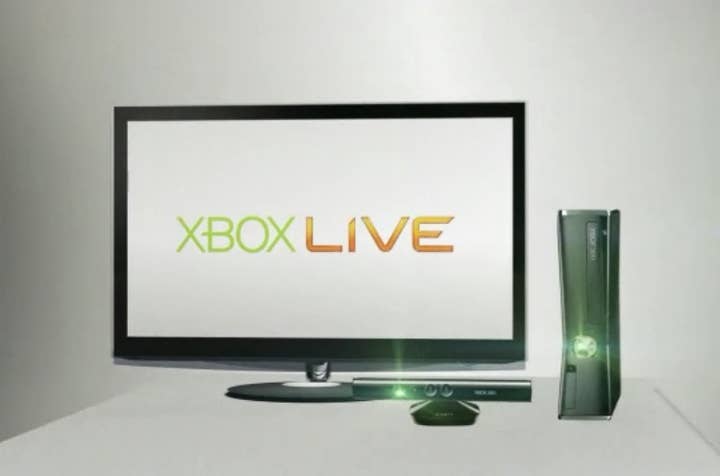
The release of the Xbox 360 had plenty of problems, from system scarcity to a weak retail lineup to faulty hardware. But it had one thing that worked phenomenally well, and that was its online integration. Microsoft completely overhauled Xbox Live for the system, changing it from little more than a persistent friends list to an honest-to-goodness ecosystem. Before Gears of War, Xbox Live was the 360's killer app. Xbox Live achievements were an instant hit at launch, changing gamer habits in powerful ways and shedding light on just how far people will go to earn virtual merit badges, an idea that would quickly spread to every corner the gaming universe. (Well, almost every corner. Nintendo, as always, did its own thing.)
The Xbox 360 launch also took Xbox Live Arcade, a forgotten experiment on the original Xbox, and used it to carve out an entirely new market of console game development. The rise in HD development costs may have killed the viability of the mid-range retail release, but early Xbox Live Arcade games like the addictive and acclaimed Geometry Wars were evidence of an unexpectedly strong market for $5 and $10 downloadable games on consoles.
Nintendo Wii Expands the Audience (November 2006)
"The Wii ushered in a new era of motion control gaming and reinvigorated the video game industry with new mainstream consumers. Non-traditional gamers from grandparents to young kids were connecting in the living room - it truly leveled the playing field for an entire household via more inclusive and interactive gameplay. Ubisoft saw the console's potential and was an early supporter of the Wii, positioning itself as the number one third party publisher leading up to and at the Wii launch with brand new franchises such as Rayman Raving Rabbids, Red Steel, and Your Shape."--Yves Guillemot, CEO of Ubisoft

Long before Nintendo announced the Wii's name or controller to the world, it had publicly code-named the console "Revolution." That would prove to be prophetic, as the Wii was a cultural phenomenon, hard to find on store shelves for its first three holiday seasons. It lacked the horsepower of the Xbox 360 or the PlayStation 3, but the Wii's controller--perfectly complemented by the pick-up-and-play fun of Wii Sports--made the system an ideal ambassador to expand the gaming audience beyond the core crowd.
All of a sudden, mainstream media coverage of games changed from scary stories of school shooters to soft-focus features about a Wii Sports bowling league at the old folks' home. Intuitive new interfaces became the order of the day, with Microsoft rolling out Kinect and Sony investing in Move. The Wii's appeal may have faded over the years, but the system worked wonders in changing not just the way people play video games, but the way they perceive them as well.
Apple Reveals iPhone, Google Intros Android (2007)
"A few years ago buttons on mobile phones were the only way to control the game. Nowadays, touch screen, gyroscope and GPS are an inalienable part of mobile gaming. And as the hardware gap between mobile devices and consoles is diminishing, more mid- and hard-core gamers turn to mobile. We see definite strengthening of the social aspects in the games as well, and I think this tendency will continue in the future. We were lucky enough to start working at the dawn of the industry, and it's exciting to see how impressive the changes are, and how it continues to evolve."--Efim Voinov, chief technology officer and co-founder of ZeptoLab
An argument could be made for either one of these events being the most significant event of the generation on their own, but there's been enough overlap in how they've upended the industry that we'll combine them into one write-up.
It was always cool, but the iPhone didn't become significant to gaming until the introduction of the App Store in its second year. Since the introduction of the App Store, the iPhone has realized its true potential, upending and all but assimilating three previously lucrative markets: mp3 players, mobile phones, and portable gaming devices. But perhaps the biggest contribution the iPhone made to the mobile gaming market was to formalize a cohesive ecosystem around it.
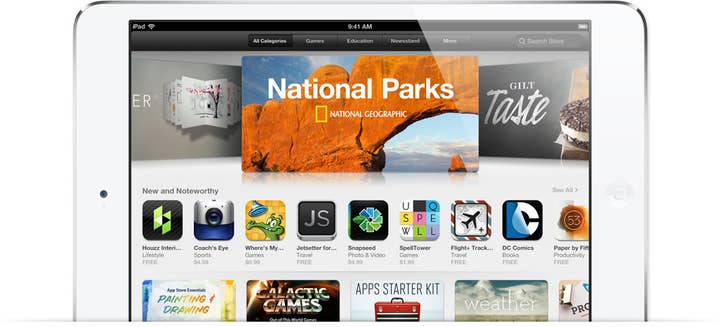
Prior to the iPhone, the carriers had their own scattered assortment of shops, selling games through them that may or may not work on the handset downloading them. The market was fragmented, and there were no assurances that a game would come to every carrier, or even the most popular of handsets. The iPhone and the App Store made the consumer experience as frictionless as possible in a way that no other mobile company had managed.
One of the key innovations was Apple's insistence on getting the user's credit card info, which made purchasing new apps as easy and painless as possible. Further down the road, the introduction of in-app purchasing unlocked a tidal wave of spending and solidified the domination of the free-to-play model. Apple brought ubiquity to the market, and in so doing opened the floodgates of developer support, ensuring the App Store would never lack for quantity of games.
Meanwhile, Android has provided Apple's iOS with an open-source competitor, a necessary counterweight giving consumers and developers another option for mobile platforms, and an inexpensive, open-ended, and unrestricted one, at that. A key part of the Android project was the desire to create an operating system with "no central point of failure, so that no single industry player could restrict or control the innovations of any other." If games are to realize their potential as a creative medium, developers can't always be subject to the whims of a corporate censor. Android ensures that no matter how dominant the smartphone and tablet market become in gaming, there will be a place for games like Phone Story and Endgame Syria.
Android's approach has been a success, with the operating system now in more devices around the world than iOS. However, Google's OS hasn't exactly eclipsed the competition, as Apple still takes the lion's share of revenue from mobile gaming.
The Free-to-Play Boom (2009-2011)
"Free-to-play has been successful because it acknowledges that all players are different, and it provides them a variety of ways to access, play, and purchase content. Free-to-play is beautiful in its simplicity. It democratizes and makes true capitalism out of the gaming space. Free-to-play keeps games evergreen, opens them up to a wider audience, and forces true competition. There is so much free content out there; to truly compete, you have to create great content. With great content, everyone wins."--John Smedley, president of Sony Online Entertainment
Free-to-play games have been around for more than a decade, but it was only during this generation that they really took root in the West. From the astronomical rise of Facebook games to more core-targeted efforts like World of Tanks and League of Legends, the free-to-play model has been adapted to serve essentially every audience in the industry. At the same time, it has underscored the enormous potential of social ties to enrich game experiences (to say nothing of game developers!) and provide compelling entertainment.
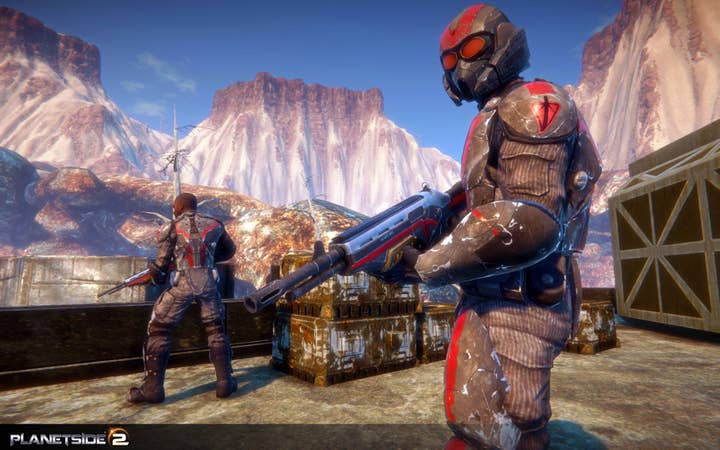
Free-to-play has also introduced new challenges for designers, changing the way they think about the relationship to their audience. In the most successful and enduring free-to-play games, the business model has been intertwined with the primary gameplay, but it has not been the driver of that gameplay. Designers need to give players a reason to spend their money while avoiding a pay-to-win model where only the free-spending players are enjoying themselves.
The free-to-play model has attracted legions of developers to mobile platforms, and even those who didn't make the jump are putting its principles to use on virtually every other platform where games are played. Free-to-play has conquered the MMORPG market, with only World of Warcraft still holding fast to subscriptions (and gearing up, apparently, to shift to free-to-play). Now free-to-play is coming to consoles in a big way with World of Tanks for the Xbox 360, and in the process it's already revolutionized Microsoft's processes and policies for updates. The free-to-play business model is sure to be an important part of the future of every game platform.
iPad Debuts (April 2010)
"Apple's iPhone was already well on its way to securing a foothold as one of the 'key' game platforms when the iPad hit the market, and when it did, the two Apple devices Voltron'ed into arguably the most course-altering combo in this era of the games industry. With the launch of the iPad, the floodgates swung open and both consumers and developers raced onto the platform. And although it's hard to see past the jaw-dropping financial impact the iPad had on our industry, it also had another impact: large screen touch-based (aka tablet) gaming became a platform unto itself."--Nathan Vella, co-founder and president of Sword & Sworcery developer Capy
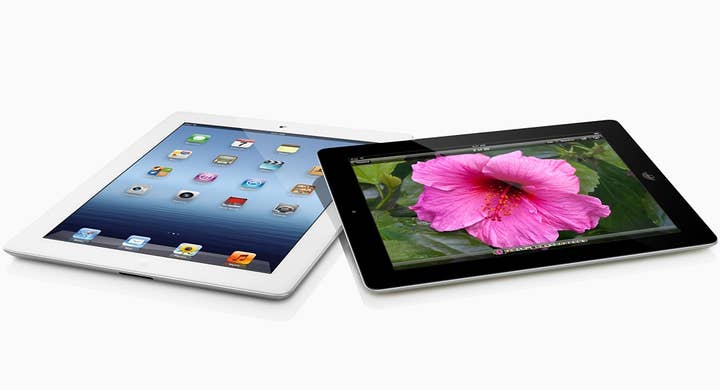
The debut of iOS and Android devices, free-to-play games, and the introduction of tablets are all intertwined. Each enabled the others, and the combination of them all redefined the game industry, or at least reallocated it. While the traditional console market lagged, these innovations thrived.
It may seem obvious in retrospect, but tablets were not pre-destined for success. When Apple unveiled the iPad, it was derided by many as a larger iPhone that couldn't make calls. No less an industry visionary than Jesse Schell mocked the device in a DICE Summit talk, calling it an oversized Swiss Army Knife that nobody would want, a stupid idea. Schell has since acknowledged he made the wrong call, but it's not like anybody needed him to confirm that. The iPad has already sold well over 100 million units, and an entire classification of computer, the netbook, has fallen victim to its incredible ascent.
The Kickstarter Revolution (2012)
"Every creator wants to control the manner for which they develop and to decide the future of their vision. Crowd sourced financing not only allows this control but further puts the proceeds back with the owner."--Brian Fargo, founder of inXile Entertainment
One recurring theme this generation has been the ongoing erosion of barriers to entry in the gaming industry. Games are easier to get than ever before, downloaded to your pocket for free instead of purchased at the mall for $60. They're easier to play, with designers increasingly concerned about accessibility and new interfaces allowing for those without lightning reflexes to enjoy the hobby just the same. And they're also easier to make, thanks to cheaper development tools and the advent of alternative funding for developers. And as much as Minecraft needs to be namedropped somewhere in any article about the amazing things that have happened this generation, that game's alpha-funding model has not yet proven as influential as Kickstarter's approach to crowdfunding.

Double Fine Productions wasn't the first developer to turn to Kickstarter, but its success on the platform precipitated two floods: one of money from fans eager for a new Tim Schafer adventure game, and one of recognizable developers Kickstarting projects they wanted to make outside of the existing publisher system. To date, the crowdfunding platform has helped nearly 2,000 development teams raise a cumulative total of $138.6 million for game development. That may only be enough to pay for a few AAA packaged console titles, but given the dramatic upheaval in recent years, the industry doesn't rely on that market nearly as much as it used to.
Kickstarter has also changed the way developers make games. Where game development used to go in a vacuum, with people working for years before any of their work was exposed to the light of day, these Kickstarted projects are more like working in a fishbowl, where developers share everything from the earliest concept art to decisions on balancing the final game. And sometimes these developers go even further, soliciting direct input from their backers and blurring long-established lines between audience and artist. It's an inversion of the traditional game development paradigm, reflecting the interactivity of the medium with interactivity in creation. And if it proves sustainable (something it seems too early to be sure of), this could change the very nature of the industry as much as any new business model or piece of hardware ever could.
This generation has not only seen the arrival of huge new platforms, but the arrival of new business models whose impact is still unfolding. Digital distribution is changing not just distribution but the nature of game designs. Free-to-play is also changing game designs, and crowdfunding is changing the entire process of development from a secretive endeavor to a group activity conducted in public.
Many of the trends here dovetail nicely, showing a sort of synergy in their impact and working together to push the industry in the shared direction of accessibility and ubiquity. In just eight years, gaming has gone from a hobby dominated by $50 retail power fantasies enjoyed in the living room and den to one with offerings at plenty of price points, enjoyable by anyone, anywhere and about almost anything.
